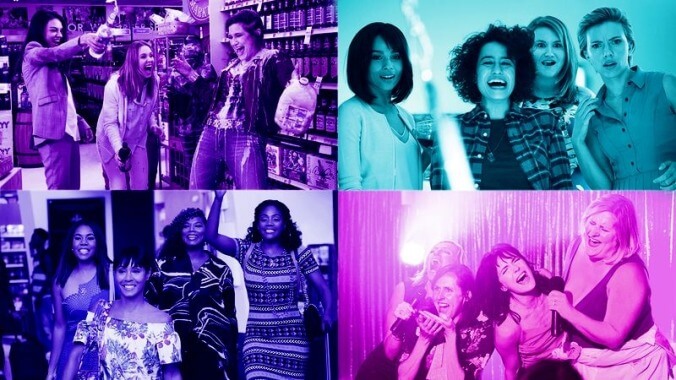The stale “women gone wild” genre could stand to shake things up

“It’s a shame that there are so few ensemble women’s films that people are only able to look at what the coincidences are,” says Alethea Jones, director of Fun Mom Dinner. “There’s such a proliferation of male content ensembles, but nobody says, ‘It’s all dudes.’ People have been talking about that we have Fun Mom in our title, and Bad Moms have moms in their title, but nobody ever asks the director and writer of Ant-Man, and Superman, and Batman… the list goes on.”
Jones has a point. While speaking to The A.V. Club, she and writer Julie Rudd make clear they realize that Fun Mom Dinner is arriving amid an especially prolific time for “moms gone wild” movies: 2017 alone has seen the release of Rough Night, Girls Trip, Fun Mom Dinner, and, come November, A Bad Moms Christmas. (Those first three arrived mere weeks apart.) Yet while Jones is correct that women’s movies are often held to a different standard, and Rudd adds that Fun Mom came from a place of personal inspiration—she drew from her own group of mom friends at her kids’ pre-kindergarten several years ago—it’s hard to overlook the similarities. This year, “women gone wild” has become a formula that borders on cliché.
Hollywood has long had a habit of taking successful trends, then repackaging them for women. When the Farrellys’ gross-out comedy There’s Something About Mary became a hit in 1998, The Sweetest Thing followed in 2002, with Mary’s Cameron Diaz and pals Christina Applegate and Selma Blair enduring glory holes and freaky oral sex/piercing accidents on their way to finding true love. After Todd Phillips raunched up the bro comedy with 2008’s R-rated bachelor party bacchanal The Hangover, 2011’s Bridesmaids became a similarly huge hit by showing that the other side of the wedding aisle could be just as down and dirty. The next year’s Bachelorette, though not nearly as popular, got even more wicked.
As Bridesmaids became the template for female comedies to follow, we’re still seeing a surge of movies about how girls wanna have fun, too, from Jason Friedberg and Aaron Seltzer’s Best Night Ever (“Likely to be appreciated only by homeless viewers who need a quiet place to nap during the cold months of winter,” said our own Ignatiy Vishnevetsky in his “F” review), to the tame, Christian-marketed Moms’ Night Out in 2014, to 2016’s Bad Moms—which, to bring things full circle, was written and directed by The Hangover’s Jon Lucas and Scott Moore. And now here we are in a year with four of them in a row.
To be fair to Jones, Rudd, and the “women gone wild” genre as a whole, these films all have their individual strengths—and weaknesses. Yes, both Rough Night and Girls Trip concern college friends reuniting over one wild weekend: a bachelorette party in the former, New Orleans’ Essence Festival in the latter. In both films, the women are all at varying levels of success, relationship status, and maturity, which makes for an interesting clash. But they diverge significantly from there: Girls Trip does an excellent, life-affirming job of exploring why some friendships fade away, and it does so with characters who feel recognizably real. The sour Rough Night is full of one-note characterizations (“The Activist,” “The Needy One”), and it turns into a horrible hybrid of Weekend At Bernie’s and Very Bad Things. There is also the not-insignificant fact that Girls Trip’s cast appeals to a criminally underserved black audience, which—along with being an entertaining romp—has certainly helped its box office success, giving it the biggest opening weekend of any live-action comedy so far this year.
